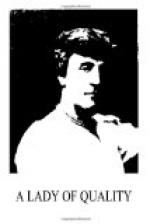“Why do you grow thin?” quoth Clorinda harshly. “You are not ill.”
“I—I do not know,” again Anne faltered. “Naught ails me. I do not know. For—forgive me!”
Clorinda laughed.
“Soft little fool,” she said, “why should you ask me to forgive you? I might as fairly ask you to forgive me, that I keep my shape and show no wasting.”
Anne rose from her chair and hurried to her sister’s side, sinking upon her knees there to kiss her hand.
“Sister,” she said, “one could never dream that you could need pardon. I love you so—that all you do, it seems to me must be right—whatsoever it might be.”
Clorinda drew her fair hands away and clasped them on the top of her head, proudly, as if she crowned herself thereby, her great and splendid eyes setting themselves upon her sister’s face.
“All that I do,” she said slowly, and with the steadfast high arrogance of an empress’ self—“All that I do is right—for me. I make it so by doing it. Do you think that I am conquered by the laws that other women crouch and whine before, because they dare not break them, though they long to do so? I am my own law—and the law of some others.”
It was by this time the first month of the summer, and to-night there was again a birth-night ball, at which the beauty was to dazzle all eyes; but ’twas of greater import than the one she had graced previously, it being to celebrate the majority of the heir to an old name and estate, who had been orphaned early, and was highly connected, counting, indeed, among the members of his family the Duke of Osmonde, who was one of the richest and most envied nobles in Great Britain, his dukedom being of the oldest, his numerous estates the most splendid and beautiful, and the long history of his family full of heroic deeds. This nobleman was also a distant kinsman to the Earl of Dunstanwolde, and at this ball, for the first time for months, Sir John Oxon appeared again.
He did not arrive on the gay scene until an hour somewhat late. But there was one who had seen him early, though no human soul had known of the event.
In the rambling, ill-cared for grounds of Wildairs Hall there was an old rose-garden, which had once been the pride and pleasure of some lady of the house, though this had been long ago; and now it was but a lonely wilderness where roses only grew because the dead Lady Wildairs had loved them, and Barbara and Anne had tended them, and with their own hands planted and pruned during their childhood and young maiden days. But of late years even they had seemed to have forgotten it, having become discouraged, perchance, having no gardeners to do the rougher work, and the weeds and brambles so running riot. There were high hedges and winding paths overgrown and run wild; the stronger rose-bushes grew in tangled masses, flinging forth their rich blooms among the weeds; such as were more delicate, struggling to live among them, became more frail and scant-blossoming season by season; a careless foot would have trodden them beneath it as their branches grew long and trailed in the grass; but for many months no foot had trodden there at all, and it was a beauteous place deserted.




